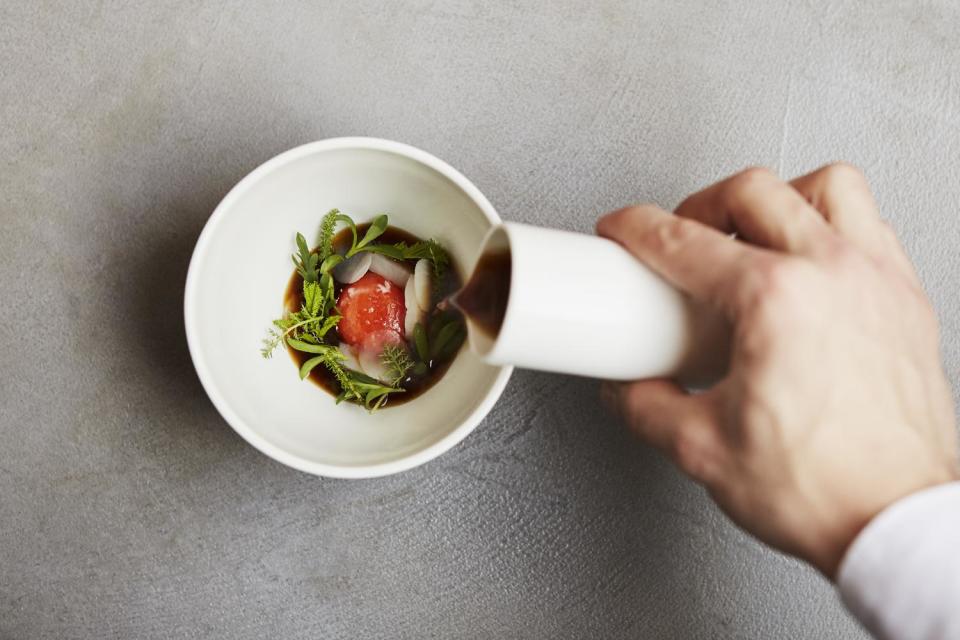Michelin 2020: London given the cold shoulder as just four new places make the guide

Michelin has long faced criticism – when you’re the king, they come for you.
It's been damned for having its favourites and for its reluctance to change, for its slowness to explore and a cold embrace of new ideas. By way of example, for years the price of entry was thought to be a white table cloth – likely never true, but certainly a sign that more modern dining rooms, those who didn’t fancy the laundry bills, took time for the inspectors to warm to. This, though, is the price of conservatism and the key to consistency. This consistency, incidentally, is what gives it so much value for so many consumers, who consider it the gold standard.
The glacial attitude was both present and not at this year’s ceremony. One surprise of the evening came at the top of the tree, with the only new three star restaurant, the Library & Lecture Room at sketch. This is the guide’s highest accolade, and they praised the Conduit Street site according: “The array of tastes and textures provided by the multi-faceted courses are truly memorable”.
Nevertheless, the room took a momentary pause after the announcement, as if drawing breath, before polite applause got going. All praise to the Lecture Room for a magnificent achievement, but it would be a lie to say it was expected: those tipped to rise to the top this year were Claude Bosi at Bibendum and Core by Clare Smyth. There was some idea that they fit the mould. That said, the Lecture Room’s head chef is Pierre Gagnaire, one of the great French cooks, a long time favourite of the guide. Earlier, Le Dame de Pic’s bumping up from one to two marked Anne Sophie-Pic’s seventh star. Was this a night of Michelin sticking to their own?
No, not really: Ireland and Scotland had their best turn in years, and in England, Manchester got its first star in more than 40 years (the former incumbent was somewhere called, of course, the French Restaurant, which had a star 1974-75). Early on, Michelin’s sales and marketing director, Roman Perrier, made much of sustainability, and spoke around the idea of sourcing local food and, with the Irish wins particularly, it does feel like something the red book is truly sweet on.
The biggest surprise, really, was that Michelin seemed to have fallen out of love with London. Where previously the capital has often been the darling of the UK guide, this year it felt anything but. At the UK’s other restaurant awards – the AA Hospitality Awards, say, or Restaurant Magazine’s well respected round-up – there was no sign of things being amiss. Harden’s hadn’t noted anything wrong. But where were the new London additions? There were just four new one stars: The Dysart Petersham in Richmond, Da Terra in Bethnal Green, Endo at the Rotunda and Mãos, Shoreditch. All have excellent reputations.
Still – where was Cornerstone? The AA named it their restaurant of the year, Restaurant Magazine put it third in the UK. What about Adam Handling, with the stunning Frog in Covent Garden? Staying in the neighbourhood, how about Frenchie? Over in Mayfair, Indian Accent felt worthy, while Rohit Ghai’s Kutir is another Indian that feels overlooked. In Fitzrovia, is the imposing door at Mere really putting the inspectors off? And did the Araki really deserve to lose all three stars? True, chef Mitsuhiro Araki returned to Japan, but long-term protege Marty Lau, who took over, was seen as a safe pair of hands; to not even leave the place with one feels a touch odd. It is also very possibly a death blow to a business where reputation is everything (this reputation, after all, the convincer for those booking a £310 tasting menu). There are many others that missed out, too.
Maybe this year was Michelin stretching out, warming up, flexing the muscles. It's taken on the perception of a "Michelin-style" restaurant, ignoring those that seemingly fit the bill perfectly – Ben Murphy at Launceston Place would seem to be a shoe-in, but perhaps it’s all a bit on the nose – and ignoring the hype of Twitter, Instagram and the like. Michelin can’t be swayed, in other words: what it says goes, and perhaps no amount of hype, bluster or PR campaigns can affect things otherwise. Maybe it's being stricter with its standards as well.
If so, Michelin deserves praise. It does too for their embrace of cooking further afield; it seems evident it's travelled more broadly, eaten more widely and looked for the lesser-known places and plates. Maybe London has let it down, after all. On the other hand – nobody can get everywhere. Does London offer too much of a good thing?

 Yahoo News
Yahoo News 